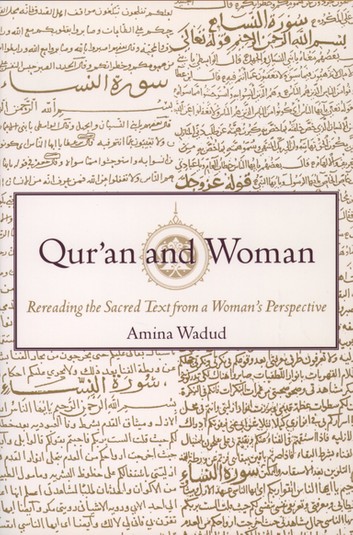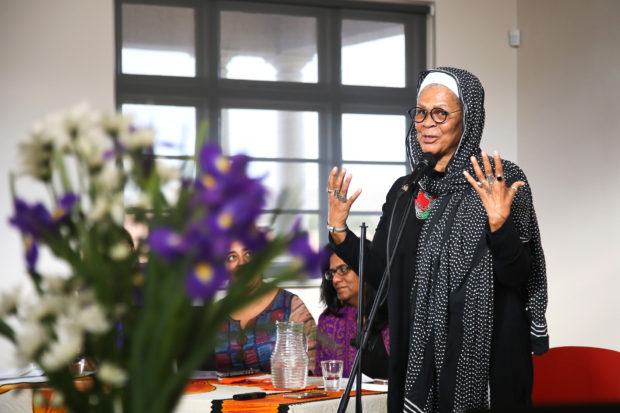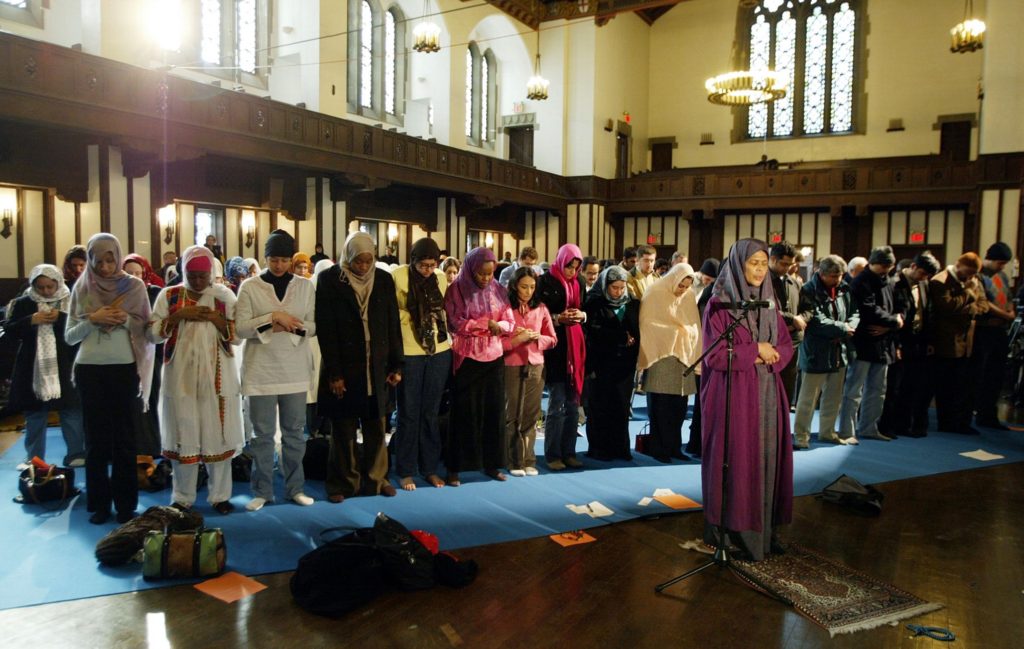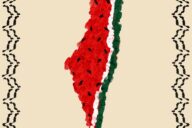One of the greatest contributions to Islamic feminist thought can be found in the figure of Amina Wadud. An intellectual and activist, her work revolutionised the understanding of women in Islam, promoting a new interpretation of the sacred text and the spiritual role that women should play in religious practice.
Alfonso Casani – FUNCI
Amina Wadud (born Mary Theasley) was born in Bethesda, Maryland, USA, in 1952 into a Methodist family. She came into contact with Islam at the University of Pennsylvania while pursuing a Bachelor of Science degree and converted to Islam in 1972, two years before finishing her studies. From then on, her academic interests were directed towards understanding the religion, and she completed an MA in Near Eastern studies and a PhD in Islamic studies at the University of Michigan, with academic stays at Cairo University and El Azhar.
It should be an ambition of every academic and researcher for knowledge to transcend the library and university corridors, and in the case of Amina Wadud, this aspiration translated into her participation in the Malaysian-based Sisters of Islam and the beginning of a relevant life of activism aimed at promoting the role of women in the dissemination of spirituality. Both have as their theoretical pillar her major work, The Qur’an and Woman: Rereading the Sacred Text from a Woman’s Perspetive (1992).
Wadud’s feminist and spiritual activity became known worldwide in 2005, after she led the first Friday prayer (salat) for a mixed congregation of believers in New York. This activity contradicts the customary permitted practice in Islam whereby only men, imams, are allowed to lead mass prayers. The celebration, which was attended by a hundred people, was promoted by the association Muslim Women’s Freedom Tour and took place in a synodal church, in the face of the refusal of various mosques to host the event and the security risks it posed[1]. The event contributed to opening a debate on the role women should play in religious practice, but it was also heavily criticised by conservative sectors as being contrary to the precepts of Islam.
However, this was not her first such activity. A decade earlier, Wadud had caused controversy by delivering a speech at the Claremont Main Road Mosque in Cape Town, South Africa, as a prelude to the Friday prayer at the place of worship. In addition, the Muslim Women’s Freedom Tour is a dynamic initiative that promotes women’s empowerment in mosques in the United States by encouraging women believers to occupy worship spaces[2].
Islamic feminism and the hermeneutics of tawhid
This understanding of feminism creates a tension between social change and women’s emancipation, and the prevalence of Muslim identity.
Wadud’s scientific production is part of the development of the second wave of feminism, which demanded the suppression of discriminatory practices against women in their daily lives, and which, from an academic perspective, contributed to introducing the question of gender in social studies[3]. From this perspective, the development of Islamic feminism, which gained momentum from the 1970s onwards, contributed to questioning the promotion of a Western hegemonic view of feminism from within feminism, and with it, the so-called secularist feminism, which associated women’s emancipation with Western secularist social values, and was criticised for reflecting a tendency towards a Western notion of progress, closer to white middle and upper-middle class women[4].
 This understanding of feminism creates a tension between social change and women’s emancipation, and the prevalence of Muslim identity[5]. In the face of this conflict, Wadud’s academic work, developed between 1988 and 1992 and collected in the aforementioned work The Qur’an and Women, presents a double dimension. On the one hand, her work is part of feminist critique, striving to offer a new epistemological vision that questions “build the notion of the normative human from the experiences and perspectives of the male person”[6]. However, this questioning of the patriarchal vision is not enough. The thinking developed by Wadud also strives to show the relevance of the Qur’an in women’s lives today, and the possibility of combining feminist critique with spirituality. To this end, Wadud carries out a work of exegesis or reinterpretation of Islamic sources from a feminist perspective. Her work aims to transcend the analysis of the role of women in society, culture and history, in order to analyse the Qur’an as the main source of authority in Islam.
This understanding of feminism creates a tension between social change and women’s emancipation, and the prevalence of Muslim identity[5]. In the face of this conflict, Wadud’s academic work, developed between 1988 and 1992 and collected in the aforementioned work The Qur’an and Women, presents a double dimension. On the one hand, her work is part of feminist critique, striving to offer a new epistemological vision that questions “build the notion of the normative human from the experiences and perspectives of the male person”[6]. However, this questioning of the patriarchal vision is not enough. The thinking developed by Wadud also strives to show the relevance of the Qur’an in women’s lives today, and the possibility of combining feminist critique with spirituality. To this end, Wadud carries out a work of exegesis or reinterpretation of Islamic sources from a feminist perspective. Her work aims to transcend the analysis of the role of women in society, culture and history, in order to analyse the Qur’an as the main source of authority in Islam.
“I believe the Qur’an adapts to the context of the modern woman as smoothly as it adapted to the original Muslim community fourteen centuries ago. This adaptation can be demonstrated if the text is interpreted with her in mind, thus indicating the universality of the text. Any interpretations which narrowly apply the Qur’anic guidelines only to literal mimics of the original community do an injustice to the text.”[7]
Wadud bases this on the distinction between shari’a and fiqh, according to which the former refers to Islamic law, and the latter to the knowledge that jurists have, and promote, of that Islamic law, i.e. the jurisprudence and interpretation that has historically been made of the Qur’an and Islamic law. This interpretation, made by human beings, is impregnated with the principles of the time, contributing to endow Islamic jurisprudence with eminently masculine values that are more unequal and less favourable to the situation and rights of women. Wadud’s proposed exegesis is aimed at altering this fiqh, in an effort to recover the original values of the Qur’an and to highlight the place occupied by women within it.
To this end, Wadud proposes what she called the hermeneutics of tawhid (the oneness of God), which emphasises the unity of the Qur’an in a way that gives meaning to all parts of the sacred text. Instead of a differentiated interpretation of each of these parts, Wadud proposes a reading that enhances the “Qur’anic coherence” and translates the values of the Qur’an as a whole[8]. This interpretation also involves an exercise in contextualising the language and reality of the time in which the revelation takes place.
Through this reinterpretation, Wadud seeks to achieve social justice, which she defines as “[her] personal experiences of inequities because of race, class and gender; and [her] search in the Islamic tradition, and more precisely, in the Qur’anic text, for a perspective on civil society which dispels the tendencies towards oppression and social injustice”[9].
Activism and “gender jihad”
 One of the most important aspects of Amina Wadud’s biography is her link between academic work and social activism. From this perspective, her scientific output becomes a tool for achieving social justice and improving the situation of women. It is a means, not an end.
One of the most important aspects of Amina Wadud’s biography is her link between academic work and social activism. From this perspective, her scientific output becomes a tool for achieving social justice and improving the situation of women. It is a means, not an end.
Wadud’s social commitment has been translated into multiple expressions and initiatives. After completing her doctoral thesis, during a stay in Malaysia in 1995, Wadud participated in the founding of Sisters of Islam, a non-governmental organisation based in this South Asian country that aims to promote the development of women’s rights in the country, through scientific and hermeneutic work that deconstructs the injustice and inequalities existing in Islamic jurisprudence. Her work is closely linked to the postulates defended by Wadud, and actively draws from her work The Qur’an and Women. Despite this, and although she continues to collaborate with the organisation, Wadud publicly distanced himself from it in 2006, to prevent negative reactions to her work as imam from spilling over into the association[10].
Her social activism has been captured under what she calls gender jihad, understood as “the struggle to establish gender justice in Muslim thought and praxis”[11]. This struggle or jihad seeks to bring together intellectual discourse, activism and spirituality through an activity of reforming Islam that is also projected into the daily lives of Muslim women. Wadud’s work as a professor of Islamic studies, a Muslim and an activist is recorded in her book Inside the Gender Jihad: Women’s Reform in Islam.
Conclusion: reform in Islam and feminism
The work of Wadud’s Qur’an and Woman has become a cornerstone of Islamic feminism, promoting and strengthening hermeneutical efforts by Muslim women, and going beyond the realm of academia. This is undoubtedly one of the most remarkable aspects of the figure presented in this article, the effort to intertwine thought and activism, ensuring a translation on the ground of the teachings elaborated from the universities.
The reactions and criticisms Amina Wadud has received for her involvement in leading sermons in mosques reflect the tensions between multiple understandings of Islam, from liberal to more conservative positions, from interpretations coming from Muslim-majority countries to those promoted as minorities in Western countries. But just as importantly, Wadud’s activism has also provided an impetus for a more open and inclusive feminism, adapted to the multiple and varied social, cultural and spiritual realities of women across the globe. The re-reading promoted in her works highlights the compatibility between Islam and women’s rights and the way in which these permeate the sacred text, but also the need for a feminist re-reading of Islamic jurisprudence.
References
[1] http://www.studying-islam.org/articletext.aspx?id=955
[2] https://www.washingtonpost.com/wp-dyn/content/article/2005/06/04/AR2005060401646.html?sub=AR
[3] Espínola, A. F. (2010). La segunda ola del Movimiento Feminista: el surgimiento de la Teoría de Género Feminista. Mneme – Revista De Humanidades, 5(11). Recuperado de https://periodicos.ufrn.br/mneme/article/view/245
[4] Duval, S. (1998). “New Veils and New Voices: Islamist Women’s Groups in Egypt”, en Ask, K., & Tjomsland, M. (Eds.). Women and Islamization: Contemporary Dimensions of Discourse on Gender Relations (1st ed.). Routledge. https://doi.org/10.4324/9781003135814
[5] Jawad, H. (2003). “Muslim Feminism: A Case Study of Amina Wadud’s ‘Qur’an and Woman’” Source: Islamic Studies, International Islamic University, Spring 2003, Vol. 42, No. 1, pp. 107-125. https://www.jstor.org/stable/20837253
[6] Wadud, A. (1993). Qur’an and Woman. Rereading the Sacred Text from a Woman’s Perspetive, Kuala Lumpur: Penerbit Fajar Bakti Sdn Bhd.
[7] Ibid., p. 95
[8] Ibid., p. xii.
[9] Wadud, A. (1995). Towards a Qur’anic Hermeneutics of Social Justice: Race, Class and Gender. Journal of Law and Religion, 12(1), 37–50. https://doi.org/10.2307/1051608
[10] See https://www.malaysiakini.com/letters/46289
[11] Wadud, A. (2006). Inside the Gender Jihad: Women’s Reform in Islam. Oxford: Oneworld.
















No Comments